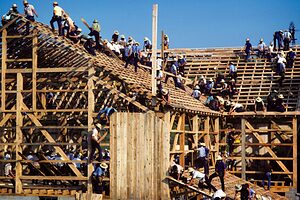The ‘Hardwood Tax Credit’ bill is supported by Glenn “GT” Thompson, Chair of the Agriculture subcommittee and Republican representative from Pennsylvania, which is home to more than 80,000 Amish—the engine room for America’s hardwood furniture industry. (Photo Credit: ClassicStock / Alamy Stock Photo)
US Homeowners could get tax credits for purchasing flooring, panelling, millwork, cabinetry, windows or skylights made from US hardwoods (and not cheap synthetic substitutes) under a new bill before the House and Senate. Inspired by Donald Trump’s order to “free up forests for timber production”, Senator Cindy Hyde-Smith (R-Miss.) said the Solid American Hardwood Tax Credit Act (S.1964) would allow taxpayers to include US-manufactured hardwood products as qualified home energy efficiency improvements under the Energy Efficient Home Improvement Credit.
“Mississippi’s sawmills and rural communities that depend on timber have been hit hard by the same economic challenges facing the industry,” according to Hyde-Smith. “This bill is designed to support the domestic hardwood industry and the jobs it provides while making American-made hardwood products more affordable for families.”
“Our goal with this legislation is to preserve rural manufacturing jobs and sawmill operations critical to local economies and national security supply chains while encouraging the use of environmentally sustainable wood products over cheap, Chinese-made synthetic alternatives.”
Senator Cindy Hyde-Smith (R-Miss.) who introduced the Solid American Hardwood Tax Credit Act (S.1964) to the US Sentate today.
The bill aims to tackle the surge of synthetic boards and other hardwood alternatives now being sold in the US market.
Imports blamed for long-term decline in domestic production
According to Hyde-Smith – who introduced the companion bill to a House bill (HR.3322) introduced by House Agriculture Committee Chairman Glenn “GT” Thompson (R-Pa.) and US Representative Terri Sewell (D-Ala.) – the domestic hardwood-grade lumber market has fallen from 6.5 billion board feet in the late 1990s to 2 billion board feet today thanks to a flood of “foreign substitutes that may contain harmful chemicals and larger carbon footprints than sustainably harvested American hardwoods.”
Under the bill – which has bipartisan support from Red and Blue States responsible for manufacturing hardwoods – the act would see the Internal Revenue Code amended to qualify American hardwood products for the home improvement energy efficiency tax credits under Section 25c of the Internal Revenue Code while offsetting the cost of the bill by eliminating a costly bonus tax credit created in the Inflation Reduction Act (IRA).
Who wants wood? US hardwood production hits a 60-year low!
The push to lift demand for local hardwoods comes after Wood Central last year revealed that the country’s annual rate of hardwood production (which includes pulpwood and other types of forest products) dropped to 5,543,898,700 board feet in 2023 – its lowest levels since 1960 and less than half of its 1999 peak (12,619,000,000) – with the local market swallowing up less than 56% of all demand, a far cry from the late 1990s, when the US market was responsible taking up 86% of all hardwoods.
As the world’s largest exporter of hardwood, the United States has offset declining local demand for hardwood by rapidly expanding trade in logs and lumber into global markets, not just through China but also through India, the Middle East, Pakistan, South East Asia, and Europe.
Source: New Bill Gives Tax Credits for American Hardwoods Over Cheap Imports | Wood Central
